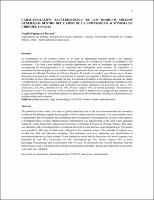| dc.contributor.author | Espinoza- Villarreal, Virgilio | |
| dc.date.accessioned | 2019-10-08T19:43:51Z | |
| dc.date.available | 2019-10-08T19:43:51Z | |
| dc.date.issued | 2019 | |
| dc.identifier.uri | http://jadimike.unachi.ac.pa/handle/123456789/138 | |
| dc.description | The problem of solid waste is an issue of global importance due to the socio-environmental and unsanitary
conditions that influence negatively the quality of life of citizens and the ecosystem. The current reality forces
to implement a kind of strategies that contemplate the investigation of microorganisms as well as their capacity
to biodegrade these residues. Bacteriological contamination was characterized in the solid waste generated
within the central field of the Autonomous University of Chiriquí, Province of Chiriquí, Panama. This study
was classified with a mixed approach, correlational descriptive scope and non-experimental design. The sample
corresponded to 306 bags of solid waste collected in five randomly places. The methods of analysis were
divided into field and laboratory sampling. The techniques used were quartering and identification of
enterobacteria present in these residues. It was obtained as results that the bacterium with more frequency was
Klebsiella sp. with 33%, Escherichia coli 29%, Enterobacter sp. 19%, Proteus vulgaris 10%, in lower
percentage Pseudomonas and Acinetobacter with 5% each. In conclusion, the research hypothesis that the
bacteriological load is not influenced by the physical parameters humidity, density and temperature in university
solid waste was validated. | es_ES |
| dc.description.abstract | The problem of solid waste is an issue of global importance due to the socio-environmental and unsanitary
conditions that influence negatively the quality of life of citizens and the ecosystem. The current reality forces
to implement a kind of strategies that contemplate the investigation of microorganisms as well as their capacity
to biodegrade these residues. Bacteriological contamination was characterized in the solid waste generated
within the central field of the Autonomous University of Chiriquí, Province of Chiriquí, Panama. This study
was classified with a mixed approach, correlational descriptive scope and non-experimental design. The sample
corresponded to 306 bags of solid waste collected in five randomly places. The methods of analysis were
divided into field and laboratory sampling. The techniques used were quartering and identification of
enterobacteria present in these residues. It was obtained as results that the bacterium with more frequency was
Klebsiella sp. with 33%, Escherichia coli 29%, Enterobacter sp. 19%, Proteus vulgaris 10%, in lower
percentage Pseudomonas and Acinetobacter with 5% each. In conclusion, the research hypothesis that the
bacteriological load is not influenced by the physical parameters humidity, density and temperature in university
solid waste was validated. | es_ES |
| dc.language | spa | |
| dc.language.iso | es | es_ES |
| dc.relation | none | |
| dc.rights | info:eu-repo/semantics/openAccess | |
| dc.subject | Environmental | es_ES |
| dc.subject | bacteriological load | es_ES |
| dc.subject | Unachi | es_ES |
| dc.subject | solid waste | es_ES |
| dc.subject | enterobacteria | es_ES |
| dc.title | CARACTERIZACIÓN BACTERIOLÓGICA DE LOS RESIDUOS SÓLIDOS GENERADOS DENTRO DEL CAMPO DE LA UNIVERSIDAD AUTÓNOMA DE CHIRIQUÍ, PANAMÁ | es_ES |
| dc.type | Article | es_ES |
| dc.type | info:eu-repo/semantics/article | |
| dc.type | info:eu-repo/semantics/draft | |

